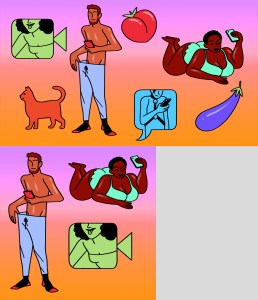Dan Rebello is a 28-year-old activist, educator, and artist who often talks about their experience of polyamory and being in a loving polycule (a connected network of people linked through their relationships to one or more members of a polyamorous group) on social media. By sharing their life with their followers, Rebello is filling the educational gap about what it means to be polyamorous, especially in a country like India, where patriarchal traditions and even pop culture infiltrate our minds with toxic expectations of monogamous relationships. As a transmasculine demiboy, they feel queer people’s politics often make them more open to the idea of polyamory, as does the pursuit of non-toxic, healthy relationships. Here, Rebello talks to VICE about how they realised they were polyamorous, stopped cheating on their monogamous partners, and grew into their authentic self through polyamory.
For everyone around me, being polyamorous, especially openly, is a radical act. To me, however, it’s just a part of my identity. But it wasn’t always like this.
Videos by VICE
Two years ago, when I realised I was polyamorous, it took a lot of time even for me to accept myself. I had to unlearn a lot of what I had learned by living in a very monogamous, patriarchal, and heteronormative society. I do have a history of trying to be monogamous, and failing at it. Back when I wasn’t even aware of the existence of the word “polyamorous”, I used to end up cheating a lot in my monogamous relationships. It wasn’t my relationships that were limiting me, it was myself. I was too afraid of being considered overly promiscuous, because our society doesn’t accept that.
I knew that whenever I liked someone, or was dating someone, I always thought about other people as well. That would make me think, “Am I a slut?”, because I knew that’s what society would label me.
At one point, it got too much. When I got out of the monogamous relationship, I was single for almost half a decade. I was seeing people here and there, but I was terribly afraid of calling it a relationship. At the same time, I didn’t even know if I was polyamorous.

But throughout those five years, I constantly felt this abundance of love in me—love that I wanted to give to other people. I had so much love that I wanted to give away, not necessarily to receive. As an asexual person, my focus was completely on these feelings of love.
Then I met this person two years ago, who was also polyamorous, and that’s how our relationship started. He’s still my partner, even though we don’t see each other very often because we live in different cities.
These two years have been an exercise in getting rid of the hold that toxic monogamy had on me. Monogamy tells you that you’re solely for your partner’s happiness, as they are for yours. And that if you like someone besides them, that is not true love. So we fall into this habit of always seeking “the one”, and believe that when we find that person, we wouldn’t need anyone else. In the process, we forget ourselves, our own needs, our happiness. I’ve experienced relationships where I’ve completely diminished and reduced myself.
And I don’t think that’s how ideal monogamy should be either, but these are some toxic traits of monogamy that stay with all of us. We are supposed to think that if we seek a partner, they should be with us for the rest of our lives. It’s like they’re the sun in this universe and we’re just revolving around them. Otherwise, our relationship is a failure. And as an extension of that, we are failures too.
As I’ve tried to embrace my polyamorous self, I’ve done away with these thoughts, and grown as a better person. Of course, it’s not been a perfect transition. Polyamory might sound like a perfect utopia, but it’s not that. It’s as human as other relationships. I do experience human emotions like jealousy and anger in my relationships; we all do. But I experience them differently than I used to before.
Often in relationships, we get really upset with our partners. We either yell at them, we don’t talk to them at all, or we’re passive aggressive. And all of these options are very damaging, to both us and them. So when I embarked on this journey, I read this book called The Ethical Slut by Dossie Easton and Janet Hardy, which is kind of like a handbook to polyamory. The book taught me to look upon these emotions with kindness. If I don’t tell my partner that I’m jealous about another partner of theirs, or something else, how will they ever know how to care for me and give me what I need? If I’m feeling something and keeping it to myself, they shouldn’t have to bear the brunt of it. I realised these emotions come from a place of fear, of feeling like, “Oh my god, what if my partner leaves me for someone else?” And there’s no space for that in polyamorous relationships. Because I know they want to be with me despite having other people in their life. That’s what the book taught me. It’s said that often jealousy is like a storm that ravages your entire relationship, but if you simply communicate these feelings, it will simply be a breeze that will pass slowly. And that also comes from a place of wanting to be honest with your partner.
I have also been through heartbreak, and it’s just as devastating. People think that just because I have multiple partners, it would be easier to get over someone who leaves. But when is losing someone you love ever easy? I’ve had breakups in the past where I’ve not been in a good space. My other partners have tried to comfort me, but they’ve also given me my space to grieve. And that’s only because they were in the know about this other relationship.
Just like in any monogamous relationship, if your partner is hiding something from you, that’s being disloyal, and dishonest. It might happen that you don’t like one of their other partners. That’s happened with me before as well. I didn’t like one of my metamours (partner’s partner, who you’re not directly involved with) because they’d wronged me in some way, so I asked my partner not to expect me to be in the same space as them. They could still see them, of course, but I didn’t want to be exposed to their presence, and that was fine. Once, we were planning a group meeting for a project we were all involved in together, and it was making me anxious to know this person would be there. But on the day, they backed out, and it was relieving. But I made sure to communicate those feelings to my partner. It was an awkward situation, but talking made it better.

Now, I’m in a polycule where I met my partner on a dating app in August 2020, and he was already dating another person. She always seemed really nice, so I wanted to be friends with her. And after some time, she herself reached out to me! It was really cute. We all went out to dinner together, and it was a lot of fun. Two weeks later, we also met her other partner, and now he and I are seeing each other. Just casually, we’re seeing where it goes. But I love being around these people, and it just happened naturally. We hang out together a lot now. We don’t have to, but it’s just convenient, and I love it!
We also recently started an Instagram page about the four of us, to just make fun content, be ourselves, and also shitpost at times. Fortunately, people have been nothing but nice. A lot of people have thanked me for being open about it, because no one in India is doing that. There are tons of polyamorous people, but they’re not talking about it openly. And so I’m also enjoying living my life as authentically as possible, and educating myself, and others, while I’m at it.
Follow Dan on Instagram.
More
From VICE
-

Photo: Eetum / Getty Images -

Photo: Lajst / Getty Images -

Photo: The Good Brigade / Getty Images -

Photo: kelly bowden / Getty Images


